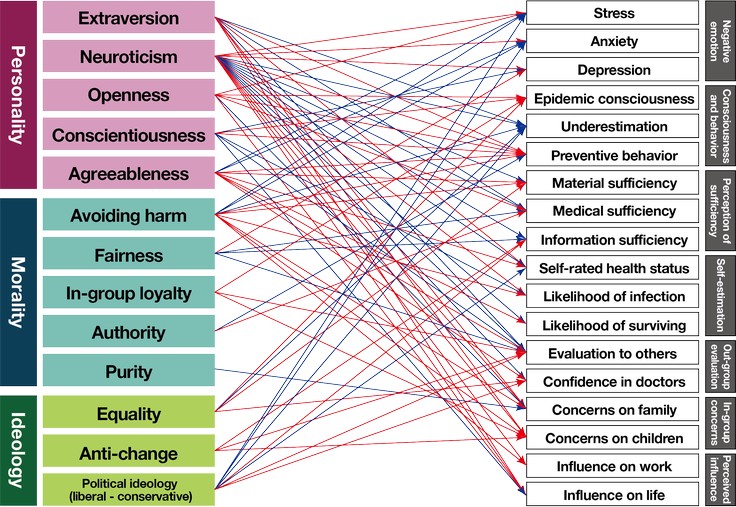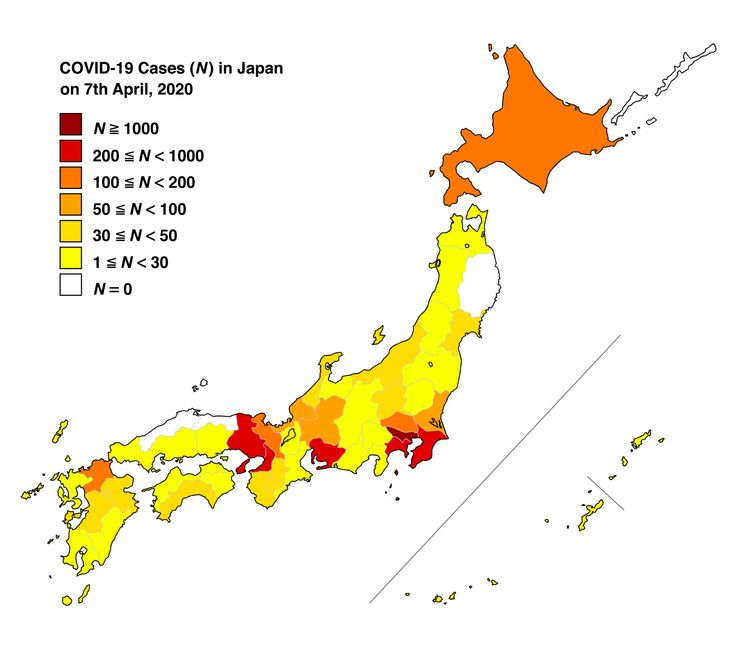研究成果 Research Results
- TOP
- News
- Research Results
- Understanding mentality and behavior in Japan in response to COVID-19
Understanding mentality and behavior in Japan in response to COVID-19
Study explores influence of personality, morality, and ideology on mental health status and preventive behaviors 2020.10.26Research ResultsHumanities & Social Sciences

Results of the survey analysis. Red lines indicate positive relationships and blue lines indicate negative relationships. The sample size was 1,856.
In the first systematic research exploring the psychobehavioral status of the general public in Japan during a public health emergency, researchers at Kyushu University have revealed how personality, morality, and ideology altered mental health status as well as preventive behaviors toward COVID-19.
The study, which also found significant differences among demographic groups, is based on the analysis of answers to an online-based questionnaire from 1,856 participants nationwide in Japan performed on April 8, the day after the Japanese Government declared its first emergency status regarding the COVID-19 pandemic.
“COVID-19 is an unprecedented pandemic that continues to affect the world and has brought misfortune to many. Human psychology plays a vital role in teaching us how to worry rationally and provide appropriate guidance,” says Kun Qian, assistant professor of Kyushu University’s Institute of Decision Science for a Sustainable Society and first author on the study published in PLOS ONE.
Based on their survey, Qian and Tetsukazu Yahara found a wealth of connections, such as neuroticism being linked to higher stress, anxiety, and depression and conscientiousness and agreeableness contributing to reduced mental burden and increased confidence regarding health, survival, and doctors. They also noticed that morality related to avoiding harm influenced cognition and behavior through various means.
These outcomes will help inform and contribute to the governance, management, and individual responses related to the COVID-19 pandemic, such as through the adoption of general measures to restrain neuroticism and motivate conscientiousness and agreeableness.
“‘Calm, Careful, Confident.’ These are the three C’s this research suggests for countering COVID-19 from the standpoint of psychology,” comments Qian. “Think calmly, act carefully, and be confident. These are keys to preparing mentally for the long battle with COVID-19.”
The researchers are now analyzing the results of a longitudinal survey conducted weekly over a span of 10 weeks to collect a cohort dataset on the mentality and behavior change due to the COVID-19 pandemic.
###
For more information about this research, see “Mentality and behavior in COVID-19 emergency status in Japan: Influence of personality, morality and ideology,” Kun Qian and Tetsukazu Yahara, PLOS ONE (2020). https://doi.org/10.1371/journal.pone.0235883
Research-related inquiries
Kun Qian, Assistant Professor
Institute of Decision Science for a Sustainable Society, Kyushu University
Contact information can also be found in the full release.
- TOP
- News
- Research Results
- Understanding mentality and behavior in Japan in response to COVID-19
































